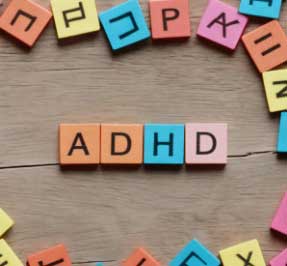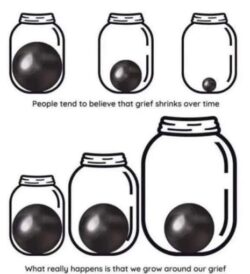 Mental and emotional health are very personal issues. So it isn’t at all surprising that so many people relate to their diagnosis in a way that feels not only permanent, but as if they are the diagnosis. No matter what condition you currently have, you are more than your diagnosis. If you had cancer, you wouldn’t tell me, “I am cancer.” You would say, “I have cancer,” or “I’m fighting cancer,” because you don’t become the disease. Yet oftentimes we hear people say things like, “I’m depressed.” It might sound like semantics, but words matter. The ways in which we identify ourselves, both internally, and to the world, matter. Shifting your language can shift your perspective, and that can shift everything. If you’ve been diagnosed with depression or anxiety, it can feel like a life sentence, but your diagnosis can change. People become depressed or anxious for a wide variety of reasons, and in many instances, those reasons aren’t permanent. Depression and anxiety can be rooted in your biology, life events, or some combination of the two. With the right combination of therapy, commitment to the process, and in some cases, medication, there is reason to be optimistic that you don’t have to suffer indefinitely.
Mental and emotional health are very personal issues. So it isn’t at all surprising that so many people relate to their diagnosis in a way that feels not only permanent, but as if they are the diagnosis. No matter what condition you currently have, you are more than your diagnosis. If you had cancer, you wouldn’t tell me, “I am cancer.” You would say, “I have cancer,” or “I’m fighting cancer,” because you don’t become the disease. Yet oftentimes we hear people say things like, “I’m depressed.” It might sound like semantics, but words matter. The ways in which we identify ourselves, both internally, and to the world, matter. Shifting your language can shift your perspective, and that can shift everything. If you’ve been diagnosed with depression or anxiety, it can feel like a life sentence, but your diagnosis can change. People become depressed or anxious for a wide variety of reasons, and in many instances, those reasons aren’t permanent. Depression and anxiety can be rooted in your biology, life events, or some combination of the two. With the right combination of therapy, commitment to the process, and in some cases, medication, there is reason to be optimistic that you don’t have to suffer indefinitely.
Increasing Your Chances of Recovery and Improving Your Quality of Life
Whatever your diagnosis, it isn’t your fault. The good news is that even though you didn’t cause the problem, you aren’t helpless. There are lots of things you can do to feel better, and possibly, recover completely. Here are a handful of things that can help.
- If you take medication, take it exactly as prescribed, and don’t stop taking it without the knowledge and assistance of your Psychiatrist
- Seek out a skilled therapist or life coach to help you develop the skills and tools to heal and manage your symptoms
- Take the skills you learn in your therapist/life coach’s office out into the world; they only work if you use them
- Identify the people in your life you can depend on for support, and resist the urge to isolate yourself
- Take a brisk walk every day; a recent Harvard study proved walking to be an effective tool in combatting depression
- Eat and sleep on a regular schedule; blood sugar dips and sleep deprivation both exacerbate depression and anxiety
Some people are able to reach the point where they shed their diagnosis and live the rest of their lives free from all symptoms. Sometimes there are long periods of remission, interspersed with bouts of depression or anxiety. Remember that every person is different, and while it is crucial to devote yourself to doing what you can to look after your emotional health, if your diagnosis doesn’t go away immediately, you are not to blame. It doesn’t mean that you are weak or a failure. No matter where you fall on the spectrum of diagnosis and recovery, being proactive can only be a good thing. Not because you have anything to prove or owe it to the world, but because you deserve to feel better. Period. Your life matters, so take matters into your own hands! Devon is a Licensed Mental Health/Substance Abuse Counselor, Personal Life Coach, Certified Personal Trainer, and a nationally certified teacher. She is committed to helping young people be their highest selves in all areas: body, mind, and spirit. Her expertise, enthusiasm, energy and educational background serve to create a unique blend of services and techniques employed to help you reach your goals. For counseling sessions, coaching, or training, please contact her at 505.469.0779 or he***************@***il.com.



